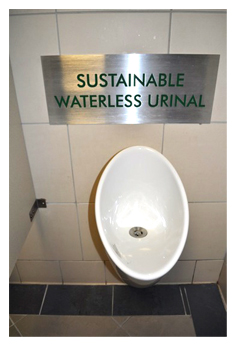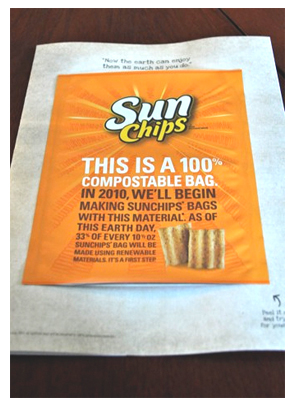It's hard not to arrive at PepisCo with a chip on your shoulder. It's a pun, but it's also true.
After all, Soda is bad for you. And chips (they own Frito-Lay) can't be healthy - they're just too darn good!
So - when I was invited to tour the Pepsi R&D facility in Valhalla, NY - I came prepared to be assaulted with PR "Spin". What I discovered was something entirely different than what I expected.
The trip to Valhalla, in the suburbs of Westchester, is 45 minutes from the City . There, the well-groomed corporate campus seems a world a way from the noise and hustle of Manhattan. In fact, a few times in the day I thought I'd gotten in time machine and gone back to 1952.
The halls of the R&D center are spotless, tiled, and look vaguely like a midwestern high-school. The building is a working laboratory, with gleaming beakers and enthusiastic and upbeat Pepsi folks in white lab coats. The Ultra geeky protective glasses are required - adding to the high-school science ambiance.
Once inside - it's clear that Pepsi is far from a local, or even national company. In fact - the challenge of the place is the increasing need for localization of brands for a multi-national company.
Localization, it seems, requires a hands-on understanding of cultures, tastes, and marketing that puts the Pepsi products worldwide on something of a collision course with customers' increasingly demanding need for unique products, new flavors, and always changing brands and promotions. This change isn't just facing food manufacturers of course. Automotive, and even media companies are facing the opportunities and challenges of a fast changing global market. But while others may be griping about these changes - journalists, for one, seem to be spilling a lot of ink bemoaning the end of their special kind of media - Pepsi seems to take it all in stride.

Putting the politics of food aside for a second, the folks in the lab coats seem genuinely excited by the complexity of how color, smell, taste, and local customs create complexity (and opportunity) in the snack business. For example, one Pepsi Colorist (think Soda, not hair) explained that an apple flavored drink had failed in China when it was golden colored (it looked too much like liquor) but had taken off when it was changed to an apple-green color. Who knew? I guess they did.
So, what about the pressure for social change? Well, first of all - whether you think it's Pepsi responding to a changing market or leading the way - sugar seems to be very much something that they're looking to reduce or replace. There were a number of new low sugar products on their way to market (Trop50, 50% less sugar in orange juice) and Pepsi has licensed a pure brand of a herb named Stevia (PureVia is the Pepsi brand name for this) to reduce sugar in many of their products.
Pepsi people as a whole seem genuinely concerned about health related issues, the environment, and their ability to make a difference in nutrition and food safety. Ok, I know - eye roll here - but wait for a second. Pepsi is run by Indra Krishnamurthy Nooyi, the CEO since 2006. The Indian born Chemist and Yale trained MBA has been named one of the most powerful women in the world by Forbes. So, she's got a global perspective, and is driving hard to create a company that has an impact. Besides the Pepsi soda brands, they own Quaker Oats, Gatorade, Frito-Lay, SoBe, Naked, Tropicana, Copella, and Mountain Dew. A snack company for sure - with a diverse mix of carbonated, non-carbonated, and so called 'salty snacks' brands.
Confession, I'm munching on a swag bag of Red Sky Sea Salt 100% Natural Potato Chips as I write this - is that bad?( Love 'em - the salty snacks. )

CEO Nooyi's internal campaign at Pepsi is called Performance With Purpose. Ok, sure - this could be a corporate marketing campaign, but it doesn't seem like it from talking to the folks and seeing what they're doing. From 100% recyclable potato chip bags to sustainable urinals, Pepsi is thinking a lot about their impact on the environment, nutrition, health, sustainability and customer's changing expectations about how products impact their bodies and the planet. Lame-O.
LINK: Performance with Purpose
Of course the proof is in the execution of Pepsi's corporate drive to be more eco-friendly, health conscious, and socially aware. And I fully expect the comments to be full of snack-food haters that think Pepsi can't be part of the solution so long as they produce Fritos. But I'm willing to be convinced otherwise. Potato chips aren't going to vanish off the planet - and unless they do - making them more healthy, and their packaging bio-degradable seems like a good thing.
You could say this is just good business sense - but there seems to be more going on than that.
Maybe you saw the "Dear Mr. President" campaign? Here's what it looked like if you missed it during the Inauguration:
It was a Pepsi driven, user-submitted video 'letter' that captured passions of voters, and connected the Pepsi "refresh everything" campaign to the changing political climate. It was the work of Ami Irazabal, Pepsi's U.S. brand marketing director. The campaign got more than 700 video entries and 750,000 You Tube views. Hmm... is that just luck, or is Pepsi putting its marketing money where its corporate mouth is- and embracing and encouraging change?
It's easy to believe that big is inherently bad. And I'm certainly a fan of the shift to slow food, small media, and handmade goods. But big could also allow a company to do big good things - and there's no doubt that Pepsi has the global footprint to foster real change if they wan to. The irony of all this is that when I arrived, I thought I had gone back in time. But I came away from the Pepsi tour thinking about change, and the future, more than the past.
Could bio-degradable potato chip bags be the start of something big? Stay tuned to the Salty Snacks channel to find out.
